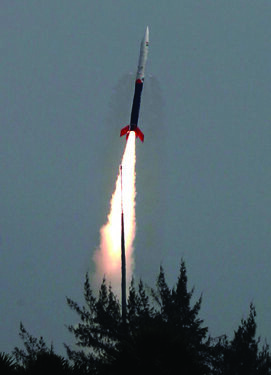NE SCIENCE & TECH BUREAU
SRIHARIKOTA, NOV 18
The mission marks the thumping entry of the private sector into the Indian space program on the lines of the US, Europe, and China. Skyroot Aerospace on Friday made history by launching India’s first privately made rocket Vikram-S into space. The successful launch marks the entry of the private sector into the Indian space program, which has so far, remained government-controlled and funded.
Thanks dear @narendramodi ji for your transformational vision for India’s private space, which is the bedrock on which we accomplished our milestone today. We are happy to be part of India’s space history and look forward to be a strong part of its bright future.@isro @inspace https://t.co/OTYKuZj2Ru
— Skyroot Aerospace (@SkyrootA) November 18, 2022
The Vikram-S rocket launched from the sounding rocket complex of the Indian Space Research Organisation (ISRO)’s Satish Dhawan Space Centre in Sriharikota. The rocket was launched with three customer payloads into space touching an altitude of over 90 kilometers.
It was amazing interacting with you @DrJitendraSingh ji and having you visit Vikram-S on the Launchpad.
Your passion for the growth of Indian space sector and entrepreneurship is inspiring. Thanks a lot for spending valuable time with us and cheering for the historic launch. https://t.co/E9IqHbPRSr
— Skyroot Aerospace (@SkyrootA) November 18, 2022
The company said that the Vikram-S rocket touched a peak altitude of 89.9 kilometers gaining a speed of Mach 5, five times the speed of sound. The launch vehicles met all the mission parameters, clearing the stage for the company to launch the Vikram-I rocket next year.
“We made history today by launching India’s first private rocket. It is a symbol of new India, and just the #Prarambh of a great future,” Pawan Kumar Chandanam Co-Founder, Skyroot Aerospace, said after the launch.
Quick facts on Vikram-S rocket just as it gets ready to be launched. Watch the action here. https://t.co/p2DOuRFiIA#Prarambh #OpeningSpaceForAll pic.twitter.com/mvJOXpjMw3
— Skyroot Aerospace (@SkyrootA) November 18, 2022
While Prarambh was a demonstration mission, it was still a full-scale suborbital launch for the company, which aims to strengthen the private space sector in the company. The mission validated the technology, engine, and designs of the Vikram rocket and demonstrated that it is capable of launching heavy payloads into Low Earth Orbit.
The company is developing three variants of the Vikram rocket, named after Dr. Vikram Sarabhai, the founder of the Indian space program. While the Vikram-I can carry 480 kilograms of payload to Low Earth Orbit, the Vikram-II is equipped to lift off with 595 kilograms of cargo. Meanwhile, Vikram-III can launch with an 815 kg to 500 km Low Inclination Orbit.
The mission marks the thumping entry of the private sector into the Indian space program on the lines of the US, Europe, and China. While the rocket was developed by Skyroot, Isro provided expertise and facilities to test the systems and technological developments.
The development shows that the private sector is capable of not just developing and designing these launch vehicles but also attracting customers and investments into the sector, which has largely been dependent on the public exchequer. India recently opened its space sector for private companies and the announcement shows that the system is working. Isro and InSpace have been working closely with private companies in providing expertise and technical know-how about the systems and complex designs of a rocket system.












